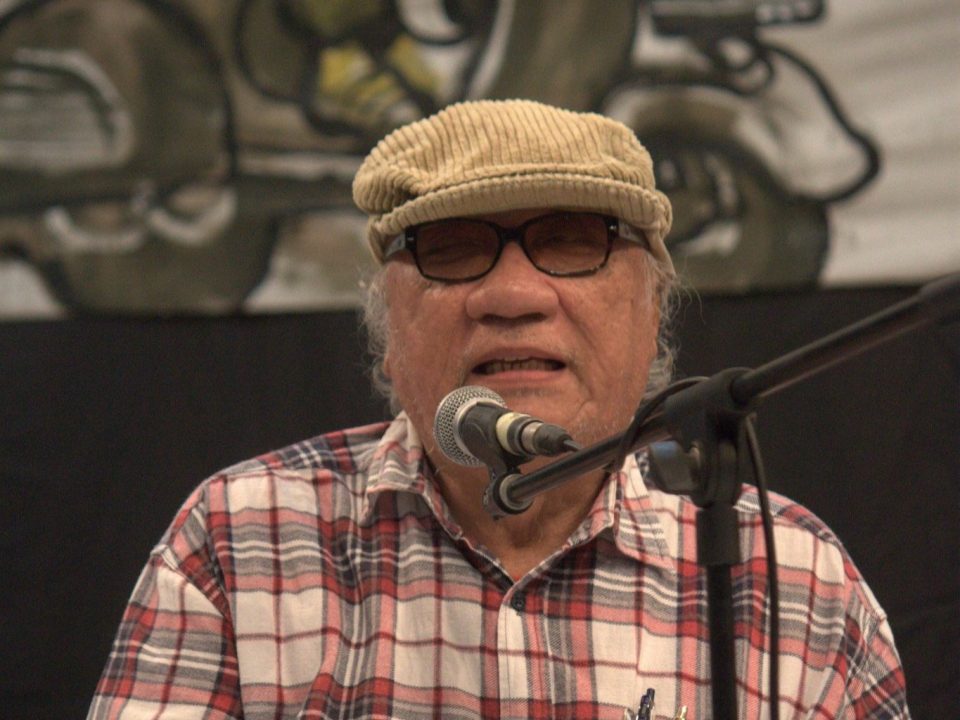“At that time, very early in the morning on 11th October 2014…..
I received a text from a friend of mine named Heny Khair saying that Bakdi Soemanto, a famous litterateur and an emeritus professor of literature at Gadjah Mada University passed away at 3:30am.
This horrific news quickly reminded me of the days when I attended his class, which was enlightening and soothing during my study at Gadjah Mada University years ago.
Bakdi Sumanto was born on 31st October 1941. He should have celebrated his 73rd birthday in days to come. In addition to teaching at Gadjah Mada University, Sanata Dharma University, Surakarta Muhammadiyah University and other universities at home and abroad, he has served as the chairman of the Arts Council of Yogyakarta. He has been a regular writer at Kedaulatan Rakyat daily, where he has his own column, Glenak Glenik, published every Sunday along with Kompas daily. He was very productive in writing poetry, short stories, novels, academic writings, and op-ed pieces. Sumanto was indeed a prolific writer.
Looking into his literary works such as Bibir (Lips), Doktor Plimin (Doctor Plimin) and The Magician—some of his short stories collections—readers would find Sumanto’s capability of viewing things from the humorous side even in the darkest aspects of life. This makes sense considering his enthusiasm for Anton Chekhov and Jean-Paul Sartre. To him, Chekhovian humour is instrumental in assessing the maturity of society, while Sartre’s notions wake us to absurd parts of day-to-day actual life.
On top of that, Sumanto should be seen as a great figure committed to giving heart to cultural literacy when it comes to facing and responding to the country’s various challenges and hurdles for years. His entire writings—fiction, academic pieces and op-ed articles—suggest the significance of cultural mindset in managing and restoring this nation to its own root. He believes that culture is what makes us human – central to the cultural approach for which the country calls the need for passion.
While attending his book launch on 29th October 2011, Belajar Bela Rasa (Learning Compassion) to celebrate his 70th birthday in Kedaulatan Rakyat daily headquartered in Yogyakarta, my eyes were stuck on a very enticing snippet, “No gedibal, no general. It means that there are no leaders without followers. In other words, it is people who make someone a leader” (p.23). It is quite short but full of meanings and purposes. A moral message in the snippet remains relevant to Indonesia’s current social and political landscape. Through this snippet, Sumanto managed to catapult satirical tones and scold many issues softly and deeply.
Due to his vast knowledge of the country’s historical and cultural facts, he is known for being an optimistic humanist. He many times asserts that this country never runs out of great people. There was Abdurrahman “Gus Dur” Wahid, who had been collectively regarded as the father of pluralism. While Bung Tomo was praised for his astonishing heroism to declare war on the Dutch, W.S. Rendra and Munir appeared on the public stage to fight against injustice. Now we have political leaders and business tycoons, but not great people. Sumanto attributed their failure of being great people to their reluctance to learn from those greats.
According to Sumanto, politics would be fruitful so long as it does not run contrary to the country’s cultural character. He believes that politics, which is initially considered tactical arts or activities of government, has moved any further and gone beyond its true essence. It is now similar to pragmatics, referring to the reward one gets for doing something.
To him, “politics for politics par se” without cultural and moral literacy would contribute to the emergence of the dark side of human beings. Ruling figures with double personalities confuse their followers since there is a yawning gap between saying and doing. His criticism of the central government in terms of the bill on the special status of Yogyakarta (RUUK) basically aired his voice over the fact that the government preferred political to historical and cultural references.
As a scholar raised by and devoted to safeguarding Javanese culture, Sumanto couldn’t get himself disconnected from two things: Yogyakarta city and the Javanese language. In his various articles, Sumanto suggested that the people of Yogyakarta had gotten accustomed to appreciating and respecting multiculturalism, implying the right of newcomers or outsiders to live with dignity.
Regarding the Javanese language and culture, Sumanto pointed out how race-based friendship is no longer evident with Javanese becoming their daily language instead of the Indonesian language. It is to some extent that the use of local language in daily conversation contributes to having ethnic conflicts boil down quite easily. Javanese would never complain about and are used to best wishes for the Chinese-Indonesians celebrating their new year, such as Gong Xi Fa Cai (wishing you prosperity), Sen Ti An Kang (wishing you good health), Ma Jing Shen (wishing you good spirit and good health), and Wan Shi Ru Yi (may your wish come true).
Prof. Dr Christophorus Soebakdi Soemanto, M.A is gone for good. Yet his intellectual works would last longer than his biological age. I see that his locality cannot prevent me from getting the point that culture is not merely a matter of art but also concerned with real life. Rest in Peace, my guru. Your works will always illuminate the darkness of disoriented people and enlighten those to keep moving ahead in one direction.




